The Stories They Didn't Tell Me
Sxwíxwtn (Wilson Williams) on discovering his parent's untold pain and the legacy of resilience it left behind.

Sxwíxwtn (Wilson Williams) is a board member here at Vancouver Opera, as well as a respected cultural ambassador of Sḵwx̱wú7mesh Úxwumixw (the Squamish Nation), an elected Councillor, a leader, and the chief spokesperson. And he brings his community stories, traditions and spirit into spaces across Vancouver.
Wilson's contributions at Vancouver Opera have enriched our understanding of indigenous culture, offered us the profound privilege of connecting with Sḵwx̱wú7mesh Úxwumixw (the Squamish Nation), through his words, his welcomes, which he does for every one of our main stage operas, and his boundless wisdom. Today we're going to explore Wilson's journey, from his childhood influences the legacy of his father, to his reflections on truth, reconciliation, and cultural healing in today's world.
So you were chatting with Prince Harry this morning?
Sxwíxwtn (Wilson Williams):
Yeah, it was quite a morning.
Ashley Daniel Foot:
Is this normal for you just to turn on Zoom and there's Prince Harry?
Sxwíxwtn (Wilson Williams):
Most recently, yes. It's quite a normal thing. My kids laugh at me! It never ceases to amaze me, all of the things I've been honoured and presented to be able to do and call my work.

Ashley Daniel Foot:
You're the chief spokesperson for Sḵwx̱wú7mesh Úxwumixw (the Squamish Nation) as well as an elected Councillor. What does that translate to in a day-to-day?
Sxwíxwtn (Wilson Williams):
It's quite versatile, I found, serving my 11th year as an elected official for Sḵwx̱wú7mesh Úxwumixw (the Squamish Nation). But it's presented quite an opportunity when you look at our land partnerships, our land developments most recently, but more so brought us closer together with some of the other Nations, which you would call here in the city of Vancouver, host Nations, which is the Sḵwx̱wú7mesh (Squamish), xʷməθkʷəy̓əm (Musqueam), and səlilwətaɬ (Tsleil Waututh) peoples. And we're all connected through family and history and that has brought us intimately more together. I say most importantly as family, but more about addressing our economic wealth and sustainability as people, as we integrate to mainstream society, as we struggled with that for many years, since whether you want to call residential school or colonialism, or just the fact that indigenous people here in Canada weren't considered citizens until a certain amount of years ago.
Ashley Daniel Foot:
Jody Wilson-Raybould writes about the importance of responsibility and service and leadership, and what does it mean for you to be recognized as a leader within Sḵwx̱wú7mesh Úxwumixw (the Squamish Nation)?
Sxwíxwtn (Wilson Williams):
It means a lot. I have a lot of passion that has sparked since I was a little kid and I always wondered what that was. But becoming a mature adult, I've found ways, and really seeing challenges our younger generations were having, even younger than myself when I was a young 20-year-old, graduating and figuring out what my place was in the world, the space I carry on this Earth. Part of that, I believe today, is what I'm doing is giving back in whatever capacity that is, at a leadership level where I carry now so much wisdom and knowledge that I'm very grateful for 11 years. But not only that, growing up in our community, giving back means something where you make it better for the next generation.
Now being a proud father of three daughters lights that fire even bigger, and you want our future generations to experience things easier than we did. And coming from parents that were in residential school-
Ashley Daniel Foot:
That was your parents?
Sxwíxwtn (Wilson Williams):
My parents, yes. And I never knew the traumas that they faced until I was about 20 years old. I used to get home from going to Catholic school for 12 years. I'd get home at grade 10 and I'd be screaming at my parents why we live this way. And our household was challenged with substance abuse, and verbal abuse, and physical abuse. And I always wondered why, and I went to a school where everybody was more stable.
Wellness Supports and Resources
Indian Residential School Survivors Society - A partner with FNHA in providing access to counselling, cultural, and emotional support services to former students of residential school and day schools, including families regardless of status: 1-800-721-0066
KUU-US Crisis Line Society - Crisis services for Indigenous people across BC: 1-800-588-8717
Tsow-Tun Le Lum Society - Confidential outreach services that include counselling, cultural support, and personal wellness programs: 1-888-406-3123
Hope for Wellness Help Line - Mental health counselling and crisis intervention by phone or online: 1-855-242-3310
Ashley Daniel Foot:
So there was that tension between the life that you had at school and then coming home?
Sxwíxwtn (Wilson Williams):
Yes. I kind of reference it as my parents as they went to residential school, even though my experience wasn't as excruciating as theirs. Mine was I'd go to school and really vision myself to live a life like my friends and my teammates, because sports really helped me get through high school.
Ashley Daniel Foot:
What sports were you playing?
Sxwíxwtn (Wilson Williams):
Anything from rugby, basketball and lacrosse were the sports I did, and track and field. And I'll share one quick story, where my mom was so happy. The day someone dropped lacrosse stick and lacrosse gear at my door and said, "Get in the car, we're taking you to practice."
My mom was so happy, because I was so energetic and full of zest that she was glad I got involved. Because always wanted to play hockey, we couldn't afford it, couldn't afford lacrosse either until the day lacrosse stick and gear was left at my door and a car door was open waiting for me.

Ashley Daniel Foot:
Michelle Good writes about memory as both a gift and a burden. When you think about your parents, and you've shared with me your late father, are there memories of your father or childhood that continue to guide you and comfort you? Or is it always a little bit of a little Both?
Sxwíxwtn (Wilson Williams):
Yeah, it's a little bit of both, but I am guided by great memories with my dad, my connection I had with him. I always remember this one, when I was a young energetic child where when you're young you feel can conquer anything. You're never wrong in some senses. But my dad raced me. I said, "Do you want to race?" Because I was in track and I was at school, I was in grade, I think I was in grade five or six and he raced me and he pulled way ahead, but then he made it look like I caught him by being faster and let me win. And I remember that so vividly. I remember him laughing and hugging me and saying, "Way to go!" and give me a high five.
I'm one to also look at some of the challenges that my dad faced and the life he lived that I got to hear from him too before he had left us on this earth, is what he experienced in either high school, because the transcending side of me going to school and coming home and experiencing the challenges. They had it worse and my parents had to live two lives. They go to school and they're disciplined. They're in residential school where they're not allowed to share their language, practice ceremony, sing or dance, not have long hair and dress the way they were.
And then they go home… And my dad especially, their house was full. They had like 20 people in their little rancher house. And they'd go home and it would be his grandma, my great-grandmother, Rose Williams that would speak fluent Sḵwx̱wú7mesh sníchim (Squamish language) and everyone in the house was proud of who they were as Squamish people. So there was this kind of double life. My parents had to live this place where they didn't want to go residential school and then going home, that confusion kind of is hard.
Ashley Daniel Foot:
It's really hard.
Sxwíxwtn (Wilson Williams):
So you could imagine that. So when I think about both my parents, my heart goes out to them because that day I came home and apologized to my parents and said, "I'm sorry for yelling for the last few years on why we live this way. I understand that."
Ashley Daniel Foot:
When did you do that?
Sxwíxwtn (Wilson Williams):
It was around when I was 20 or 22, but we grew from there. Those years on my parents were great, and I worked together with them and that opened up a new door after that apology to my parents, especially for me as a young adult.
Ashley Daniel Foot:
I heard you mention your grandmother, Rose.
Sxwíxwtn (Wilson Williams):
She had passed away long before I arrived. But the stories that come down, how much of a strong matriarch she was for our family and kept us together, made sure we were safe. She was the one that put food on a table and even though there was about 20 people in the house, everyone was comfortable.
Ashley Daniel Foot:
And were those 20 people always there?
Sxwíxwtn (Wilson Williams):
There was always at least three generations in homes. And as we're building community and our community was growing, that there was the challenges with infrastructure and housing. So our families made it work. And that's the story I carry with ours, is that our family made it work. We had an orchard outside, they always made bread every morning and there was always food, and they would go out and sell the art and they're weaving, basket weaving and all these things would be traded or sold To be able to do that.
Ashley Daniel Foot:
I want to know more about the transformation from somebody who felt upset when you come home. And you took all of those feelings and you have become a voice, you have become a beacon, not only in your community but for all of us as to why we need to continue to listen to each other. What propelled you to that next step?
Sxwíxwtn (Wilson Williams):
I think that learning some of that history, I never realized because my parents as we grew up, didn't talk about residential school, so they didn't share that part of their life. And I never asked myself why until I became a young adult, where I started learning some truths that happened to our people, and some of our people would be sharing pictures and there's my mom and dad and different pictures at the schools. And I think this transformation was a true awakening. It actually made me work harder for what I wanted. I think it had opened doors for me for challenging myself. I started to play music. I started to go back into school and learn certain things, and graduate, take chances and risks.
When I look at things like unspoken courage, and that's what I see in my parents, the fact that they survived and lived as long as my dad did and my mom is still with us, and she has the biggest heart, and I know where I get these things.
Ashley Daniel Foot:
What were their names?
Sxwíxwtn (Wilson Williams):
My late father's name is Barry Williams and my mom is Elaine Williams.
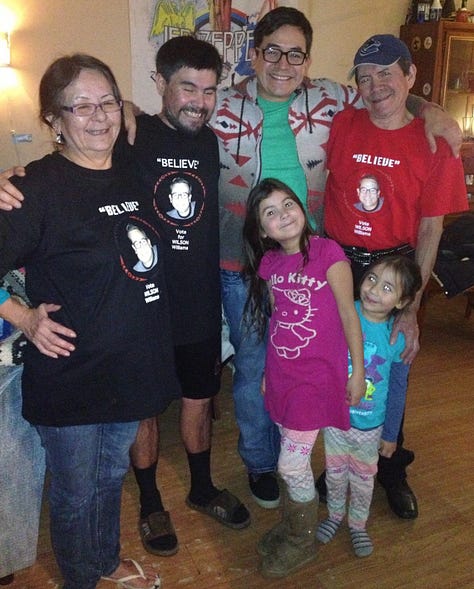
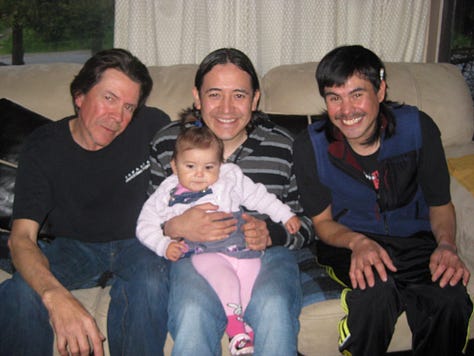
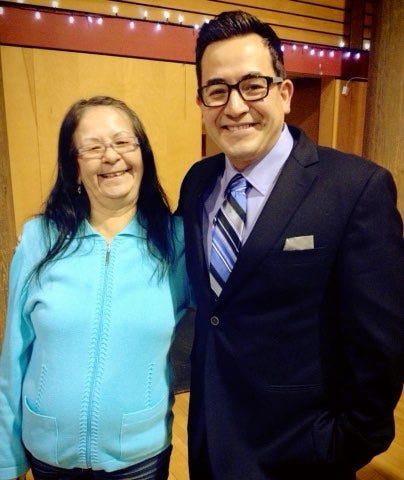
Ashley Daniel Foot:
What role does the arts have to play in our understanding of each other and story?
Sxwíxwtn (Wilson Williams):
It speaks volumes. The last months my dad was with me, and he was an artist, he was a drawer and Coast Salish artist, and he was a storyteller, but you wouldn't know by knowing him. But he carried a lot of knowledge and I recorded him a few times. Without him knowing, because he probably wouldn't share so intimately what he was talking about, because I wanted to learn history of our family. And I'm very blessed to have that today.
When you look through the arts, my dad was always that artist. He loved the unknown, he loved being creative and sharing his story through art. And my dad didn't draw and share his art a lot, but when he was sick and people showed me what they have of him and asked for copies, so I made copies and brought it up to my dad in the hospital. And he was laughing. He was like, "Oh yeah, I remember that." But he does have a big mural in our community he did in 1977, months before I came into the world. And his name is on the big piece there, which is beautiful.
Ashley Daniel Foot:
What's the piece?
Sxwíxwtn (Wilson Williams):
It's a piece of a Thunderbird and also the two-headed sea-serpent, which relates to our legends of our people and the survival of our people. And my dad was a part of that project with Stan Joseph, senior who he was mentoring under at that time.
Ashley Daniel Foot:
What were some of the first stories or teachings specifically that helped you understand who you were from the Sḵwx̱wú7mesh (Squamish) culture?
Sxwíxwtn (Wilson Williams):
I think my experiences first started when I was a young child. It was my grandfather, Percy Paull was my mom's father. He was a politician too, and this is where the lineage of politicians that are in my family, and my grandfather Percy was the son of Andy Paull. He was very well known to our people and helped transform our nation as well. He spearheaded the Amalgamation in 1923. He created the Indian Brotherhood, which helped advocate for indigenous people on their rights and title and connection to the lands.
He was a lawyer by trade. And at the time, in the early 1900s that if you wanted to practice law as an indigenous person, you would have to give up your status, which means that you would be no longer considered indigenous. So he practiced law under the radar and helped indigenous people with their rights and connection to the land, because there was a big movement there that was influenced. And I think from a delegation that went to see the king in 1906, that told King Edward that, "We're still here, our people are still here. Please stop taking everything away that we have, our life, our being, and the land and resources that our people are connected to and survived off of." So very strong recent lineage connected to politics, but also the indigenous movement that helped us get to where we're at today.
Ashley Daniel Foot:
Murray Sinclair, the late Murray Sinclair now, emphasized that reconciliation involves both truth and meaningful action. In your work, what do you think action looks like both in the daily sense and in the broader journey of what reconciliation is in Vancouver?
Sxwíxwtn (Wilson Williams):
May he rest in peace. Such a vibrant leader, left a staple for indigenous people today and a legacy that our indigenous people in Canada will never forget. Speaking of Truth and Reconciliation, I think that when you look at action today, and Murray was a spearhead in this creating the Calls to Action. I think that we've come a long way since that was implemented, and he got to see the fruits of a lot of his work. But I think when you look at action, it's more about building that relationship. It's more than just being recognized in your own territory. It's more than just doing a land acknowledgement. It's more about, what's the retention we can get and the connectivity we can get?
Ashley Daniel Foot:
You mentioned land acknowledgements. You've been doing them for us for over three seasons now. You mentioned that we need to go beyond what a land acknowledgement typically means. What do you mean by that?
Sxwíxwtn (Wilson Williams):
When I talk about building a relationship or looking at retention, it's about that true understanding, why we're here acknowledging the beautiful place name we have here of Vancouver is K'emk'emelay, which is the place of great maple trees. And you hear this me every night at the theatre, and I never get tired of saying it.
And I ask people to have that open-heart mind to understanding the history, the dark history. But it's not all that dark. There's a lot of good history, and I share this where the shorelines, when people first peoples come to the lands, our people were welcoming. When we share, we put our hands up on as Coast Salish peoples here, it's a sign of welcome today. But in the long ago, it was a sign of no weapons happens, and they wanted the people in the boats and canoes to reciprocate that, so so they knew to come in peace. But it was also the protocol was, "Let's share a meal and get to know you."
So when you look at what a land acknowledge means to me or our family, let's make it meaningful. Let's build a relationship and understand each other, because we reciprocate that. We want to know who you are and where you come from, and have that mutual understanding, and more importantly, mutual respect.
Ashley Daniel Foot:
Art has the power to reclaim and reinforce identity. What role do you think cultural performance or territorial welcomes, what do they do in strengthening the Sḵwx̱wú7mesh (Squamish) identity within the Vancouver arts community?
Sxwíxwtn (Wilson Williams):
Alone with the opera, it's come a long way. I really retain a lot of respect for the blessings we do with the cast. And it's such an honour to bring my wife to a few of the cast blessings.
Ashley Daniel Foot:
The wonderful Kaiya Williams.
Sxwíxwtn (Wilson Williams):
Yes. Yes. And she's a language teacher and runs our language nest where she teaches the language, sign language, in the Sḵwx̱wú7mesh Sníchim to our little ones who are infant with their parents and toddlers with their parents.
But more importantly, I think that the blessings we do, it opens up vulnerability of everybody. Ask for them to have an open heart and mind, but also let the energy flow through them. We share prayer song.
And I think the biggest thing is about empowering them, and sharing a little history and language about who we are and where we come from and how we've done things, how we've survived and overcome barriers as peoples, that it was our culture, our traditions, because it was different before contact here. And I think when you come with that open and heart mind, you start understanding why we do things the way we do. Our people come from the land. And I am so proud to share both my lineages from my parents, my Sḵwx̱wú7mesh lineage. And I've only become spiritual 11 years ago when I got on a leadership role because I had to really dig deep and understand why I was started in the field, certain things.
Ashley Daniel Foot:
What did you feel?
Sxwíxwtn (Wilson Williams):
A Western doctor would say it was stress, but my mentors and teachings that came out is learning how to hone and understand my gifts, and make sure when you think about the mind, spirit and the body being able to work more in sync with what we would reference today, the Medicine Wheel. Understanding and being proud of who you are and where you come from, but at the same time, really just opening up that tunnel vision of the truth of who you are, because I started to realize who I am and where I come from. I received an ancestral name.
Ashley Daniel Foot:
What's that ancestral name?
Sxwíxwtn (Wilson Williams):
My ancestral name is Sxwíxwtn and it comes from the village of Yekw’ápsem, and it's from my dad's side of the family, and it's an honour to carry that name. So when you receive a name, there's a lot of work that goes into it. You start learning our cultural practices. It's a journey. Being a politician, you always get the people out there, antagonists or the people who challenge things and they're like, "I can't imagine being in your seat." And I'm like, "Well, it's kind of gotten easier, when you think about it." When you get that experience, but you learn how to deal with it, there's certain goals and objectives you put on yourself as peoples. And you have that trust in yourself, you're doing the right thing for your people and for the betterment of the community.
Ashley Daniel Foot:
I love asking our guests about song. I wonder if I could dare to ask if you might consider gifting us with the honour of a song.
Sxwíxwtn (Wilson Williams):
It's been an honour. I couldn't leave without sharing a gift, but I want to share a journey song. Gifted and Sharing by Xalek/Sekyu Siyam Chief Ian Campbell of Sḵwx̱wú7mesh Úxwumixw (the Squamish Nation), a song that came to him while he was on a kʷínayɬ (Quinault) journey, ocean going canoe journey with our families. And I want to thank him from the song, but at the same time, it's an uplifting song, talks about one life's journey.
Ashley Daniel Foot:
Chen kw’enmántumiyap Wilson O’Siem. What did I just say?
Sxwíxwtn (Wilson Williams):
Thank you very much. It's an honour and it's a translation to, "Very appreciative and also very appreciative to be in your presence."
Ashley Daniel Foot:
Well, it's very true. Thank you again for this blessing.
Sxwíxwtn (Wilson Williams):
What an honour to be here and end off in a good way.
Ashley Daniel Foot:
Wilson Williams has been my guest on Inside Vancouver Opera. More to come this season. Check out VancouverOpera.ca for more. Thanks to our trusty producer, Mack McGillivray.
I'll see you at the opera, Wilson.
Sxwíxwtn (Wilson Williams):
Yes, I'll see you there!
Sxwíxwtn (Wilson Williams) - Spokesperson & General Councillor for Sḵwx̱wú7mesh Úxwumixw (Squamish Nation) and Member of Vancouver Opera’s Board of Directors
Sxwíxwtn is a spokesperson and elected General Councillor for Sḵwx̱wú7mesh Úxwumixw (the Squamish Nation). Born and raised on the Skwxwú7mesh Úxwumixw homelands, he is passionate about sharing the Nation’s culture and language. He is a strong advocate for the Nation’s youth, to help ensure a bright and positive future. He believes deeply that this future is achieved by respecting and understanding the Nation’s past, to inform decisions that will carry the Nation forward. Most importantly, Sxwíxwtn is a loving husband and father to 3 girls.
Ashley Daniel Foot - Host of Inside Vancouver Opera
Ashley is Vancouver Opera’s Director of Engagement and Civic Practice and host of Inside Vancouver Opera. Boundlessly creative and fascinated by the way that art is created and presented, Ashley has guided arts organizations across Canada to craft messages and tell unique stories.
Mack McGillivray - Audio Producer and Editor
Mack is an audio producer, creating shows for radio and podcast. He is passionate about cultivating local community and a lifelong lover of opera.





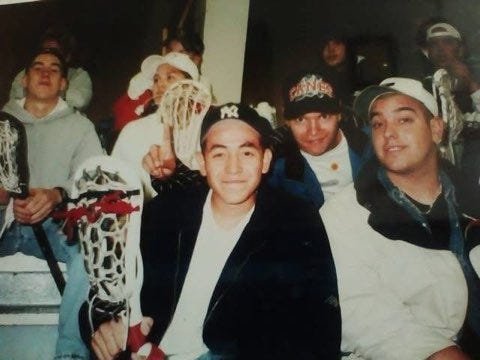
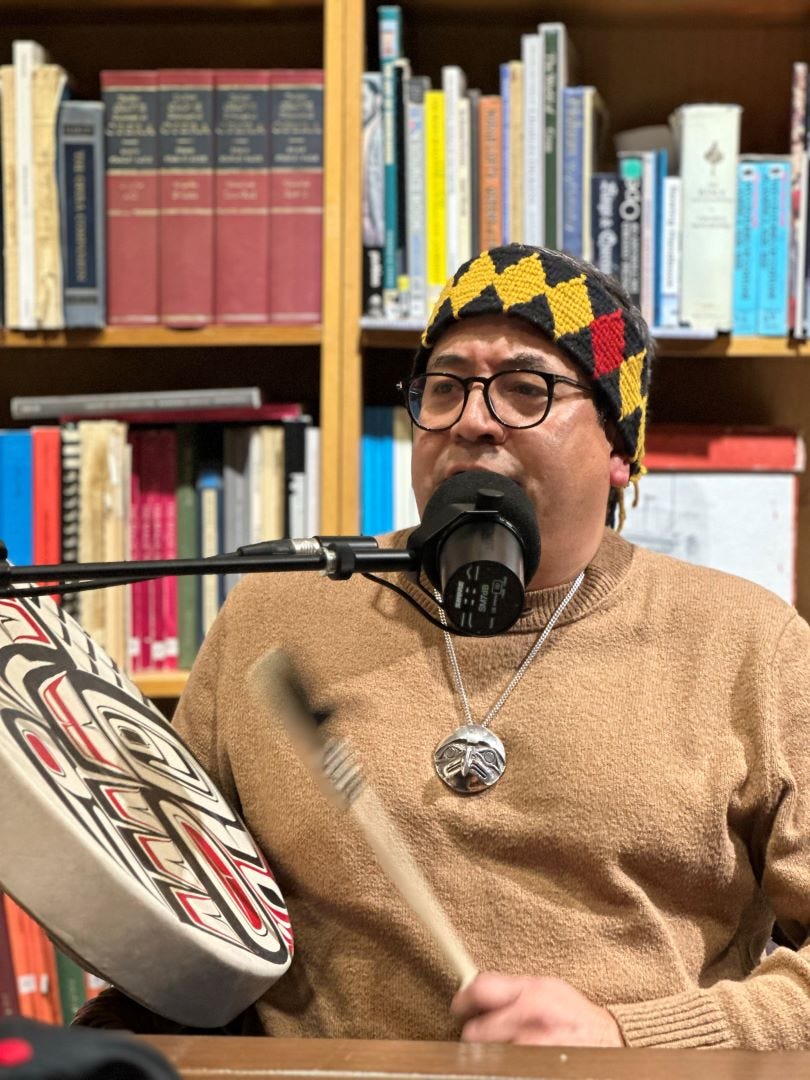

Great interview with a wonderful man. I wish we could have more shared meals to bring community together.